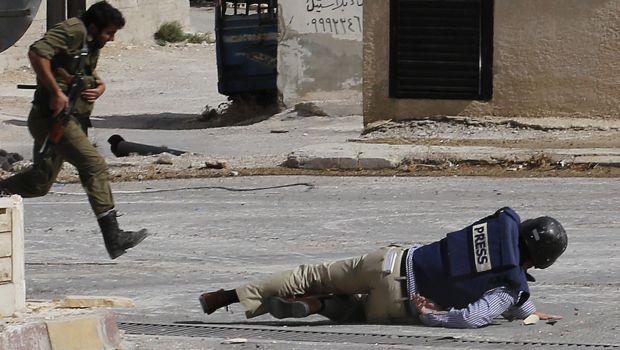
AFP reporter Sammy Ketz, hits the ground as a Syrian soldier runs past during sniper fire in the ancient Christian Syrian town of Maalula, on September 18, 2013. (AFP PHOTO/ANWAR AMRO)
Beirut, Asharq Al-Awsat—Syria has become a Journalists’ Graveyard as the bloody civil war between the Assad regime and the Syrian rebels rages on with seemingly no end in sight.
It has become increasingly difficult for journalists to even enter Syria, while travelling through the country is even more dangerous. Syria’s rebels have taken control of some territory, while others remain in the hands of the government, while the vast majority of the country is up for grabs; a dangerous and ever-present front-line.
Being a journalist no longer offers an adequate degree of protection. In fact, being a journalist in Syria means you are fated to being constantly under threat, targeted by snipers, or the subject of accusations of espionage, not to mention gunmen seeking a pay-day.
These dangers, together with the harsh restrictions the Assad government has imposed on issuing visas to journalists, make covering the conflict in Syria a dicey prospect.
Syrian human rights activist Oubaida Faris told Asharq Al-Awsat that the targeting of journalists has increased in the last six months, particularly following the emergence of the Islamic State in Iraq and Syria (ISIS) emerged.
According to the notorious Islamist group, it targets and arrests journalists whom it suspects of being spies for the regime.
According to Faris, media access to rebel-held areas is granted in coordination with activists affiliated with battalions on the ground, but dangers can arise when journalists fail to follow instructions or try to make contact with other rebel groups or battalions in order to gain more information.
“In rebel-held areas there are a number of groups that allow journalists to enter which means that they will only be targeted by the other side [the government], while in the regime areas, the same side that grants them access could also target them,” Faris said.
According to Reporters Without Borders reporting from Syria is highly dangerous, although many journalists continue to seek to travel to the war-torn region to cover events there.
The Paris-based organization announced that 25 foreign journalists and 70 Syrian media activists have died since the conflict erupted in March, 2011.
While at least 16 foreign journalists have gone missing in Syria. This growing spate of abductions has become the main concern of journalists seeking to cover the war.
Humanitarian workers and media activists in Syria also face the threat of arbitrary arrest, whether at the hands of the Assad government or Islamist rebel forces.
Due to the visa restrictions imposed by Damascus, many journalists seek to enter rebel-controlled areas of Syria by illegally crossing the border from neighboring countries, such as Lebanon, Turkey, Jordan, and Iraq.
According to Sherif Mansour of the New York-based Committee to Protect Journalists (CPJ),”We must not understate how dangerous it is to report from Syria right now.”
Mansour made this statement after a Sky New Arabia team went missing earlier this week.
According to CPJ research, the most deadly country for journalists currently is Syria, where at least 28 were killed for their work in 2012.
Speaking to Asharq Al-Awsat on the condition of anonymity, an independent journalist who has been on the ground in Syria since December, 2011 said: “In order to enter rebel-held areas in Syria, one has to move under the protection of armed groups that have a good relationship with the radical Islamist fighters.”
“Without this, the journalist could be abducted by any group operating in Idlib, Raqqa or Aleppo,” the reporter added.
The reporter also informed Asharq Al-Awsat that journalists could also bribe their way through checkpoints set up by ISIS and other Islamist groups.
The growing dangers facing journalists in Syria has prompted several international media outlets to avoid sending reporters to the country.
The Rory Peck Trust, a non-profit organization dedicated to the support and welfare of freelance news gatherers around the world has issued a travel advisory on Syria.
In a statement entitled ‘Freelancers in Syria: Do you Really Have to Go?’ the Rory Peck Trust said that the “situation for journalists in Syria is unprecedented, and it’s getting worse.”
